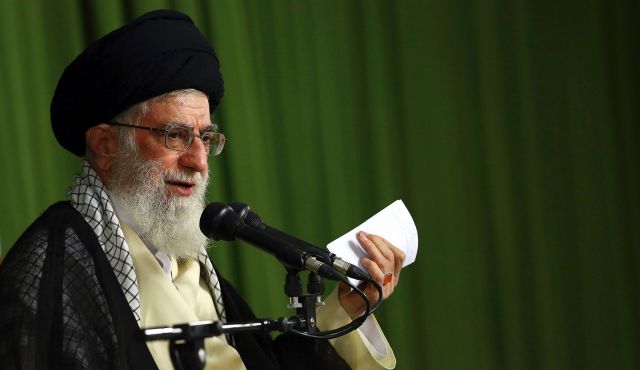Iranian-Israeli tensions heat up as both side trade slurs
Friday, 14 November 2014
Majid Rafizadeh/Al Arabiya
The geopolitical tension between Iranian and Israeli leaders has been heating up in the last few weeks. This heightened tension appears to be a rhetorical conflict so far, which underlines significant concerns for politicians on both sides.
Most recently, Iran’s Supreme Leader Ayatollah Ali Khamenei published a nine step plan which would “annihilate” Israel. In response to the question “what is the most urgent action to take for militarily confrontation in Israel,” the supreme leader stated: “The West bank should be armed like Gaza and those who are interested in Palestine’s destiny should take action to arm the people of the West bank, so that the sorrows and grieves of the Palestinian people will reduce in the light of their powerful hands and the weakness of the Zionist enemy.”Israeli Prime Minister Benjamin Netanyahu responded in a statement: “There is no moderation in Iran. It is unrepentant, unreformed, it calls for Israel’s eradication, it promotes international terrorism,” and he added “This terrorist regime in Iran must not be allowed to become a nuclear threshold power. And I call on the P5+1 countries [the United States, China, Russia, Britain, France and Germany -the five permanent members of the U.N. Security Council, plus Germany] – don’t rush into a deal that would let Iran rush to the bomb.”
Later, Iran’s supreme leader took to Twitter, tweeting a series of messages to call for the elimination of the “barbaric, wolflike & infanticidal regime of Israel.”
“From the Israeli leaders’ perspective, the U.S. appears desperate to strike a final nuclear deal while giving up to the demands of President Hassan Rowhani ”
The underlying reason of the heightened Iranian-Israeli tensions rests in the U.S.-Iran nuclear dialogue, American willingness to cooperate with the Islamic Republic on crucial national security issues, indirect cooperation in fighting the Islamic State, and the potential tilt in the regional balance of power against Israel and in favor of Iran.
Iran-U.S. cooperation on major national security issues
The recent secret letter from President Barack Obama, first reported by the Wall Street Journal, has ratcheted up Netanyahu’s anxiety towards the reliance of the White House on Iran, rather than Israel, in one of the critical issues in the Middle East. The other concern is linked to Tehran’s increasing role as a regional power with regards to the latest developments.
Accordingly, President Obama’s letter delineated the shared interest that the Washington and Tehran bear in the region, particularly in fighting the Islamic State. The letter also asked the supreme leader to grasp the opportunity in nuclear talks in order to seal a final nuclear deal. The messages from Iranian leaders, in response to President Obama’s letter, have been mixed and divided. But overwhelmingly, it appears that the Iranian leaders are signaling that they are open to overtures. This issue has sidelined Israel, close ally of the U.S., when it comes to crucial security matters in the Middle East.
In addition, what has ratcheted up the concerns of the Israeli leaders is the robust political will in the U.S. and Iran, particularly from President Obama, to seal a final and comprehensive nuclear deal and add to his questionable achievements and accomplishments in the Middle East. For Israel, the final nuclear deal would dramatically alter Iran’s geopolitical role in the region, its economic status, ratchet up cooperation between the West and Tehran as well as pull Tehran out of isolation by opening the Islamic Republic to the international market. From the Israeli leaders’ perspective, the U.S. appears desperate to strike a final nuclear deal while giving up to the demands of President Hassan Rowhani and foreign minister Javad Zarif. In the last two weeks, and particularly in Oman’s round of nuclear talks, U.S. Secretary of State John Kerry has been holding multiple bilateral talks in addition to multilateral nuclear negotiations with the French politicians, primarily Foreign Minister Laurent Fabius, as well as the Russia’s foreign minister, Sergei Lavrov.
Since France was critical of the interim nuclear deal, calling it a “sucker’s deal”, and raised concerns that it would not go along with what was outlined in the interim nuclear deal, the U.S. is currently attempting to make sure that France is on the same page with the United States with regards to the final points of nuclear negotiations, and that no final hurdles will come up in the eleventh hour.
Win-win contract
On the other hand, the bilateral talks with the Russian foreign minister are aimed at guaranteeing to Moscow that the final nuclear deal will be a win-win contract for Russia, as it will host Iran’s uranium and then enrich and reprocess the uranium into nuclear fuel for Tehran. This follows that the Islamic Republic will technically be dependent on Russia. More fundamentally, in addition to the aforementioned issues that have increased the tensions between Iran and Israel, Israel believes that the Islamic Republic will cheat its way through to build a nuclear bomb after a final and comprehensive nuclear deal is reached, or the U.S. will allow the Islamic Republic to become a “nuclear threshold state” such as Japan. Netanyahu stated, “Israel will not countenance an agreement that leaves Iran as a nuclear threshold state. This endangers us all.” In addition, from the Israeli leaders’ perspective, International Atomic Energy Agency (IAEA) and the international community would not be capable of fully monitoring all the technicalities of nuclear enrichments in the Islamic Republic as well as verifying that the Islamic Republic is complying with the rules of the final agreement. In other words, the Islamic Republic will have the international sanctions lifted and simultaneously progress to become a nuclear power.
Due to the fact that Iranian and Israeli leaders view their relationships from the perspective of a zero-sum game, for Israeli leaders, all these developments score a victory for the Islamic Republic and significant blow to Israeli leaders.



















